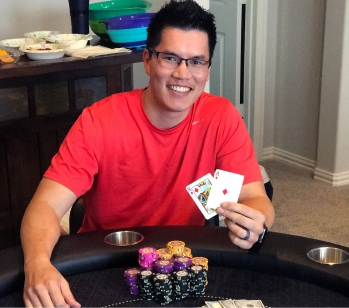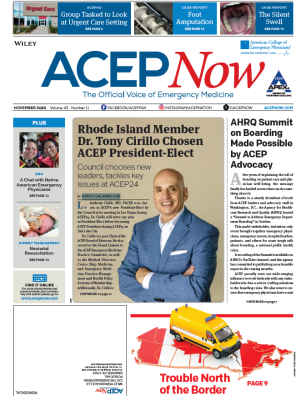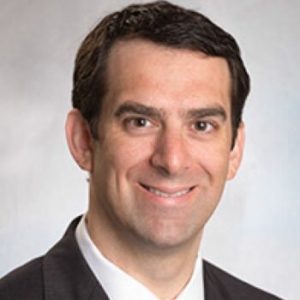
Explore This Issue
ACEP Now: Vol 37 – No 09 – September 2018Dr. Joseph Young with his winnings from the World Series of Poker’s Texas Hold ’Em Main Event.
PHOTO: Joseph Young
Joseph Young, DO, is the medical director for the emergency department at Baylor University Medical Center in Dallas. In July 2018, he placed 343 out of 7,784 entrants in the World Series of Poker’s prestigious Texas Hold ’em Main Event, held in Las Vegas, taking home $37,705 in cash. The tournament entry fee was a staggering $10,000, but the winning player earned over $9 million. We recently spoke about poker, emergency medicine, and wellness.
JF: How often do you play and when did you start playing seriously?
JY: I started in high school. As an undergraduate in Tampa, there was a casino nearby. They only had limit games. I would go and read books and play. During residency [at the University of Texas Southwestern Medical School in in Dallas] I started playing some cash games and small tournaments. When I finished residency, I found a bunch of hospital colleagues at work who liked to play, and we formed a home poker league. In fact, our sixth season is starting this Sunday. We had 10 players, and we played over 10 months for $100 per month. The winner of the league takes the entire $10,000 pot and uses it for the World Series of Poker entry fee. This year, we are up to 24 players, so we can send two players to the Main Event. Seventy percent of any winnings goes to the winning player and the remaining 30 percent is split among the other players in the league.
JF: How many times have you seen the film “Rounders”?
JY: Once!
JF: And “Molly’s Game”?
JY: That’s a great film.
JF: Was this summer your first time playing in a professional poker tournament?
JY: This was actually my second time in the World Series of Poker Main Event. I won the league last year, so I got the entry fee. This year, I paid my own way.
JF: How did last year go?
JY: Last year I did terribly; I busted on the first day. I lost three sets over sets to the same guy. Terrible. [Note: This means he had three of a kind, but that the other player had a higher three of kind. Having it happen three times to the same player is extremely bad luck.]
JF: You weren’t left with a bad taste?
JY: The tournament structure is the best in the world. You start with 50,000 chips versus 10,000 to 20,000 in most professional tournaments, and the blind levels are two hours long. [Note: This means that the required rotating antes are low with respect to the size of the players’ initial chip counts and they do not increase that frequently. This makes the game less prone to luck.] It takes patience and time. It takes mental strength and focus.
JF: Did you do anything special to prepare for the World Series?
JY: My close buddies and I bought a subscription to a website to review strategies, how to play certain positions and how to extract the most from other players. I also watched Daniel Negreanu’s Masterclass online. Chris Moorman’s Book of Poker was also helpful. These resources really help with game theory for optimal strategies.
JF: How long did you have to be in Las Vegas for the tournament?
JY: Seven days, but I blocked off two weeks just in case; that’s how long you need to be available.
JF: I like the confidence!
JY: Yeah, but I only booked the hotel for the first three days. Once I survived day one, I had to book another hotel night. Vegas was packed because there was an Ultimate Fighting Championship event happening too. So, I had to switch hotels which was a little stressful.
JF: Walk us through a day at the World Series of Poker.
JY: I try to be as healthy as possible: Get a minimum of eight hours of sleep, don’t set an alarm other than an hour before the tournament starts, just to be safe, eat breakfast (I eat a healthy egg white omelet), drink some coffee to stimulate my mind.
JF: How do you even register?
JY: You can actually carry $10,000 in cash and just register the day of. Or you can sign up a well in advance. I did it ahead of time, because I didn’t want to get robbed while having 10 grand on me. If you’d paid ahead of time, you get your seat assignment pretty quickly.
JF: How long are you playing at a time?
JY: Two hours of play, followed by a 30-minute break. Then, there’s one main dinner break. Depending on the day and the ESPN coverage, you don’t always know when you’ll get a dinner break. Each day is 12.5 hours.
JF: So you survived day one. The number of players remaining gets smaller. Did they make you switch tables?
JY: On day two, I was switched three times.
JF: Can you feel the difference between playing against a professional versus an amateur?
JY: Yes, without a doubt. You fish out info from people over time. For example, the guy next to me on day one had an interesting story. His buddy had died, and he was only was there because his friend had wanted his friends to the play the Main Event. It was in his will. So, he was very nice, but he didn’t really know what he was doing. In general, pros and amateurs play very differently. Pros often make smaller pre-flop bets [Note: bets before any community cards are placed on the table]. Even most amateurs know which cards are good starting hands, but it gets trickier after the flop. When pros know you are an amateur, they are more likely to come after you and put you in difficult spots.
JF: Did any skills you have from being an emergency physician help you at the World Series of Poker?
JY: We work in such a high stress environment and this is just a game, so you can be relaxed. Also, we see a lot of BS. People manipulating us for drugs, not telling us the full story, etc. You learn to observe behavior which you can apply to poker. You can figure out a lot about someone by how they sit or by interpreting their body language. If, all of a sudden, a player is breathing fast or if you can see their carotids or radial pulse just going like crazy …
JF: They are nervous, but is it because they are bluffing or because they have a huge hand?
JY: You have to put that information in the context of their other behavior and actions.
JF: Are you a math-based player or a gut-based “gestalt” player?
JY: Definitely more math, positional. [Note: Positional refers to changing your style of play depending on where you are sitting with respect to the players who have been forced to ante up in a particular hand.]
JF: What’s the highest hand you had in terms of value?
JY: Four of a kind was by far my best hand.
JF: What’s the worst mistake you made?
JY: I truly didn’t feel like I ever made a very bad decision. Overall, I just got whittled down at the end. There’s one hand I did not play that I regretted.
JF: Once you were officially guaranteed to be “in the money,” was your goal to reach a certain amount or to last as long as possible?
JY: The goal is to win it, for sure. We are blessed to have the careers we do. Winning $20,000 won’t change our lives. The goal is to make the final table [Note: The final table of nine players are guaranteed $1 million in prize money each.]
JF: Once around 1,000 players were left, the emergency medicine community started to notice your run. I started checking in on your progress online, as did many others, and we were rooting for you! What was it like feeling the love on Twitter and Facebook from the EM community?
JY: It was amazing. That EM Docs group on Facebook is legit. And the Twitter love was so great.
JF: Will you play in the World Series again?
JY: I’ll definitely be back next year.
Pages: 1 2 3 4 | Multi-Page





One Response to “Emergency Physician Dr. Young Is a World Series of Poker Phenom”
October 24, 2018
RKCGreat!